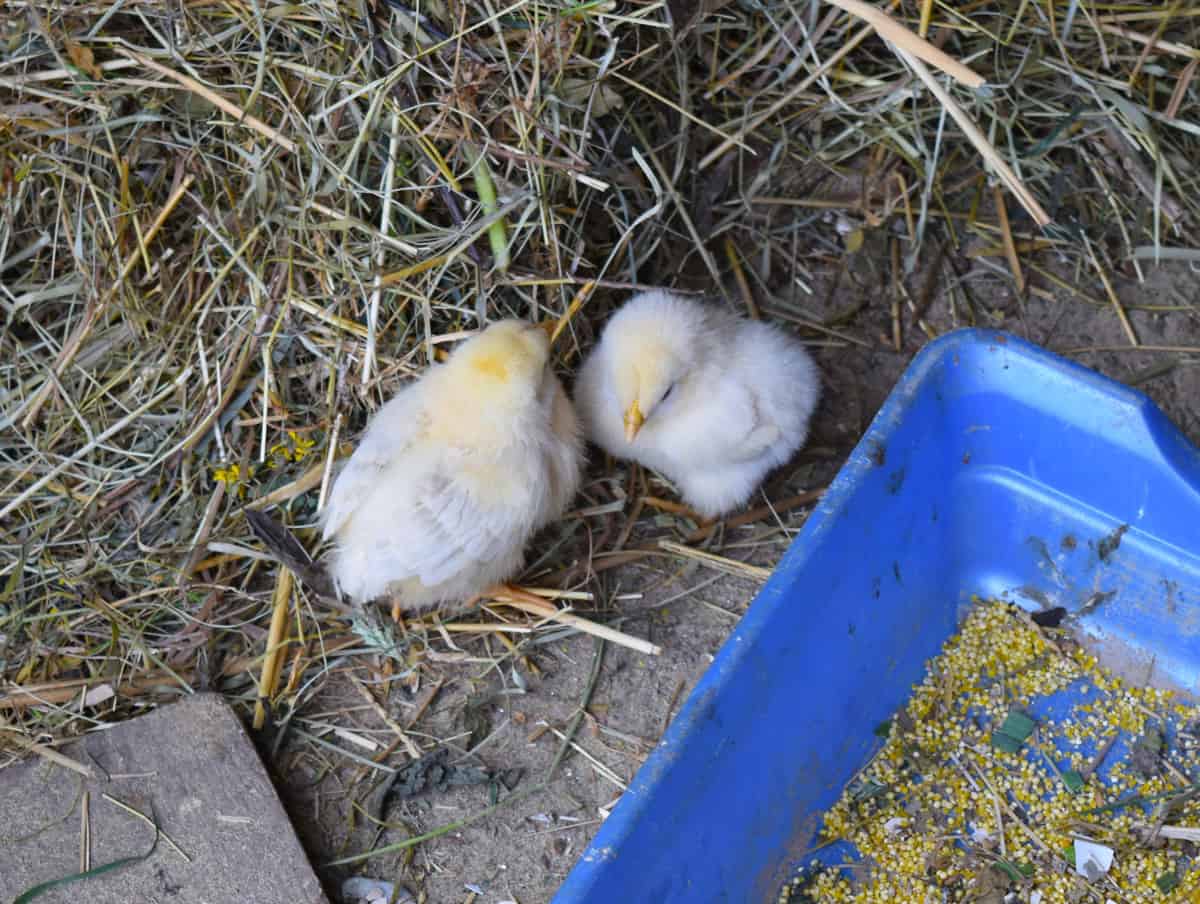You have been waiting in anticipation for your baby chicks to hatch. You have done your research on everything involving chicks, from learning how to take care of them to ensure that they have the food they need to survive in their fragile first few days of life.
Mammal babies drink milk from their mothers, but what do baby chicks eat?
A baby chick requires a nutrient-dense diet containing proteins, minerals, vitamins, fats, and grains, to stay happy and healthy. Their diet can include;
- Starter Feed
- Crickets
- Worms
- Oatmeal
- Tomatoes
- Lettuce
- Bananas
- Apples
- Strawberries
- Watermelons
- Grass
A baby chick’s feed should be 90% of their diet, and 10% should come from their pasture.
They should always have fresh, clean drinking water available to them. This article will guide you to ensure you provide the best food for your chicks, including the food they shouldn’t eat and the best food for when they get a bit older.

Foods That Chicks Can Eat
In their first few days of life, chicks need to receive a nutritionally balanced diet to aid them in healthy growth and ensure that they start a healthy foundation. The following nutrients are vital to a baby chick’s diet;
Vitamins
Poultry requires vitamin A, D, E, and K, thiamine, biotin, niacin, riboflavin, and folic acid (water- and fat-soluble vitamins).
Minerals
A mineral-rich diet is as important as vitamins; these include iron, phosphorus, magnesium, calcium, and copper.
Fat
Chickens get their fat from oil containing linoleic acid. Linoleic acid is a fatty acid that is vital in breaking down minerals and vitamins so that the chickens receive all their benefits.
Protein
A baby chicks’ diet should consist of 18 to 20% protein to ensure that they have a strong bone and muscle integrity during their early development phases; after 19 weeks, chickens only require 16% protein in their diet.
Grains
Chicken diets need to include healthy grains such as wheat soybean meal on corn which supply them with excellent sources of protein or oil and vitamins for energy.
Food that chicks can eat include;
Crickets – These insects are high in protein, carbohydrates, and fats that baby chicks require in their diet.
Worms – Not only do chickens love worms, but they are excellent sources of protein, especially red worms and mealworms. Please do not feed your chickens too many worms as it could overwhelm their fragile system.
Oatmeal – Oats are packed full of minerals, vitamins, and proteins and are considered a superfood. The perfect way to serve oatmeal to your baby chicks is by adding plain yogurt and birdseed to it. This helps to boost the oatmeal’s nutrients. Oatmeal can be served warm or raw.
Tomatoes – These beautiful fruits are full of potassium, antioxidants, vitamin K, fiber, and folic acid, supporting your chick’s overall health. However, the leaves, plants, and flowers contain solanine, which is poisonous, so make sure your baby chicks cannot reach them.
Bananas – This fruit is an excellent source of healthy carbohydrates, magnesium, and copper and is high in pyridoxine and vitamin B6. Bananas that are spotty and brown are suitable for baby chicks, but they should not eat unripe bananas.
Lettuce – Romaine lettuce is high in folate, phosphorus, magnesium, vitamin K, and potassium, which are some of the main minerals your baby chicks require in their diet. Apart from lettuce, chicks can also eat turnip greens, chard, and kale.
Apples – Seedless, chopped apples, or applesauce are fantastic sources of vitamin k, carbohydrates, potassium, and fiber, which are great for a baby chicks’ digestive system.
Strawberries – These tasty little fruits are full of minerals and vitamins such as magnesium, potassium, iron, copper, and vitamin B. They also contain anti-inflammatory antioxidants, which support a baby chick’s health.
Watermelons – Even though watermelons do not offer an abundance of nutrients, it is an added source of hydration, especially for the scorching hot days.
Grass – Picking through the grass encourages foraging, but baby chicks don’t seem to have much interest in the grass when they are 1 to 7 days old. When they do start pecking, they will find and eat their own worms.
Chicken Feed – The best chicken feed for baby chicks is organic chicken starter feed. Organic feed is full of the essential nutrients, including;
- Vitamin A, B12, D3, and E
- Riboflavin
- Calcium iodate
- Copper sulfate
- Organic carbohydrates such as wheat, soybean meal, and corn
- Calcium carbonate
- Zinc sulfate
- Folic acid
- Organic soybean oil
Organic chicken feed is non-GMO and ensures that your baby chicks only get non-medicated nutrients. *Organic food does not contain cheap fillers.

What Can’t Baby Chicks Eat?
The following foods are terrible for baby chicks and adult chickens as they contain toxins that make them sick and can even cause death. These include;
- Avocados
- Chocolate
- Eggplant
- Moldy bread
- Onions
- Peanuts
- Pickles
- Rhubarb
If your baby chicks have accidentally ingested any of these foods, make sure they receive extra nutrients and electrolytes and consult a veterinarian for advice.
What To Feed Chicks Immediately After Hatching?
Before chicks hatch out of their shell, their bodies absorb the yolk in the egg, which means that for the first 48 hours of their life, a baby chick does not require any water or food to survive.
Usually, when chicks are still inside the incubator, they don’t eat or drink anything. Here they spend about 6 to 12 hours drying and fluffing up. Once they are moved to the brooder, they are ready for their first meal.
Starter Feed
Now that your chicks have moved to the brooder, it is time to introduce them to a balanced starter feed. Do not give them the same food as your adult chickens because the high calcium levels can cause them irreversible kidney damage.
Adult chicken feed also does not contain sufficient protein levels, which is vital for a chick’s early development. Always check to see if the starter feed you give to your chicks contains 15% to 20% protein.
What Is The Best Starter Feed For Baby Chicks?
The only time you should feed medicated feed to baby chicks is in commercially hatched chicks. This is to ensure that diseases do not spread amongst the flock.
Chicken owners prefer Nature’s Best 18% Organic Chick Starter/Grower Crumbles for their baby chicks, and here’s why;
Special Diet Features
- Complete feed
- Non-medicated
- Non-GMO
- 18% protein
- Organic
- Vitamins and minerals
- Amino acids
Guaranteed Analysis
- Crude Protein – 18% (min)
- Crude Fat – 2.75% (min)
- Crude Fiber 5.5% (max)
This fantastic product from Nature’s Best provides baby chicks with a complete nutritional diet to ensure that they grow strong without genetically modified ingredients or pesticides.
Chicks can eat this starter feed up to 15 weeks of age. You only need to transition them to a lower protein diet Nature’s Best Organic 16% Egg Layer Pellets Or Crumbles when they are ready to start laying eggs.
In Conclusion
These fluffy, adorable, fragile little creatures are entirely at our mercy, so it is our responsibility to ensure that they eat healthily. If you stick to these food lists that baby chicks can and cannot eat, you have nothing to worry about.
Ensure the water and food are easily accessible to them and separate them from the older chickens during feeding time. Chickens tend to get aggressive when it comes to the pecking order. Instead, to prevent your chicks from being bullied or trampled on, let them eat away from the older flock.

